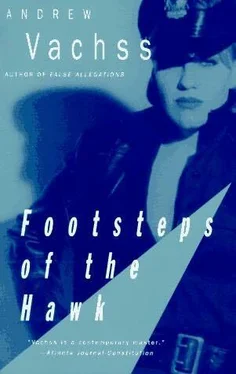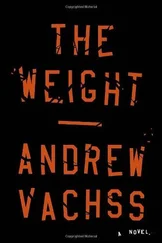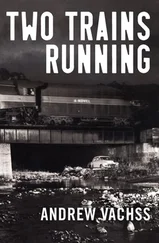The place was chambered, like the hatches in a submarine. As we walked through each set of doors, they closed behind us before the next one opened. The guard in the first chamber ran over our bodies with a hand scanner. It beeped for keys, the metal clip on ballpoint pens…anything. Hauser took out one of those giant Swiss Army knives, the red ones with enough attachments to build a house from scratch. The guard shook his head, gave Hauser a look. Hauser stared back blankly until the guard dropped his eyes. "You get this back on your way out," he muttered.
The next chamber had a metal detector we had to walk through. Then a guard led us around to the conference room. Most of the room was taken up by a long table with a wooden divider running lengthwise: attorneys on one side, clients on the other. There were also a few smaller tables scattered around, the space between them the only privacy permitted.
"There's a better room, for lawyers," Belinda said. "They let cops use it too. But I didn't want to try and talk them into letting the three of us in."
"This'll do fine," I said, casing the room. Over in the corner, a muscular black man in a blinding–white T–shirt was huddled forward, talking to another black man in a business suit. The muscular black man looked up. His eyes passed over my face like it was a blank wall.
"Hey!" A man's deep voice, greeting someone. It was Piersall, spotting Belinda. He walked over so slowly it was just this side of a swagger, a blond man with a neat haircut. His eyes were dishwater blue, set close together, his nose almost too small for his face. He smiled at all of us— his teeth were either all capped or factory–perfect. I made him at around six feet, maybe an inch over. About a hundred eighty–five pounds, most of it in the upper body. A good–looking, confident man— I could see a woman leaving a bar with him way before closing time.
He sat down, pulled a pack of smokes from the breast pocket of his prison–issue short–sleeved green shirt. He put the cigarette pack on the table, then he turned to Hauser, extended his hand.
"I'm George Piersall. You must be the reporter, right?"
"J. P. Hauser," Hauser acknowledged, shaking hands.
"And you?" Piersall asked, shifting his eyes to me. 'You're with Fortunato?"
"Juan Rodriguez," I said. "At your service."
"Where do we start?" Piersall asked.
"You're not contesting the Jersey conviction?" Hauser replied, setting the table.
"No. Not actually. I mean, it wasn't at all like they said in the indictment, but the plea offer was so good I just couldn't pass it up. I don't care about this one— I'll be going out on it quick enough. The thing is, they already dropped a detainer on me. Instead of parole, they'll just load me into a van to start another bit."
"The woman in New York?" Hauser asked. "The one on University Place? You said you— "
"Doris," Piersall interrupted. "Her name was Doris."
"Okay, Doris," Hauser agreed. "You said you…knew her. Before it…happened?"
"I did. I mean, not like we were friends or anything. I met her in a bar. We got to talking. And we went back to her place. After that, I called her a couple of times, or she'd call me. If neither of us was busy, we'd get together. You know, no big deal…But I liked her, you know what I'm saying? She was a nice kid— no reason for anyone to get rough with her."
"You think that's what happened?" I asked him, leaning in to catch his eye. "Somebody played too rough?"
"It could be," Piersall said quietly, staying right on my face. "She liked to play a little hard. Not over–the–top stuff, you know…"
"Spell it out," I said.
"Just little games. A slap in the face, grab her by the shoulders, hold her hands down while we did it. That's all."
"Somebody spotted you leaving…the night she was killed?" Hauser asked.
"Yeah. I'm not denying that. But even the autopsy report said she could of been murdered anytime— from just before I left to almost twenty–four hours later."
"Any possibility she was married? Or had a jealous boyfriend?" I asked him.
"Who knows?" He shrugged. "A girl like that, picking up guys in bars— it was probably just a matter of time anyway.
"So you figure she asked for it?" Hauser put in, the faintest undertone to his voice.
Piersall caught the undertone. Recognized it and batted it back over the net in one smooth move. "Not… that ," he said, "God forbid," ducking his head slightly, like a man trying for composure. "I mean, she was asking for trouble, okay?" he said. "Not to be killed . What I was trying to say, she was taking some risks, see?"
"So what it comes down to," I said, "is you didn't do it. That's no help. You got anything else?"
"No," Piersall said, his face open and frank. "I wish I did. What we have to do, we have to find the guy who did do it— that's my only hope."
"We'll find him, George," Belinda said, her voice calm and certain. "I know, baby," Piersall told her, reaching for her hand, squeezing it for a second. He leaned back in his chair, finally lit the cigarette he'd had in front of him since we started talking.
"This is too crowded," I said, standing up. "With all of us pumping questions at you, we're not gonna get anywhere."
"I can— " Belinda started to say.
"No, it's okay. You and J.P. run through it. I'll step out for a while. I got some paperwork to look over anyway.
"Good to have met you," Piersall said, standing up to shake hands.
"Likewise," I told him.
"Kamau Rhodes," the loudspeaker barked. I walked over to the side room marked VISITORS.
"Got more than one client in here, huh, counselor?" a fat guard commented.
"It's a living," I said.
I walked into a long, narrow room, sat down on a round stool bolted to the floor, and looked into the murky Plexiglas, its surface smudged beyond redemption by generations of handprints— the only way to say hello or goodbye in that room, hands touching each other's through the barrier. I picked up the phone on my side of the barrier. Across from me was the muscular black man who'd been in the Contact Visit Room. We stared at each other for a long minute.
"Dragon," I said.
"Burke," he replied.
A long minute passed.
"I got your kite," he finally said. "Was that him?"
"Yeah," I said. "What's the word?"
"He's in PC," the black man said. "Been there for almost a week."
"He selling tickets?"
"No."
"Turn rat?"
"No. It wasn't like that. He's not pussy either— it wasn't a voluntary."
"Tell me."
"Somebody tried to take him out. A hammer job, with a shank for backup. His luck was running good— four cops were just rolling down the corridor— routine surprise shakedown— they saw it happening. All your guy got was a knot on his head."
"They pop anyone for it?"
"No. They were pros— hoods and gloves, long sleeves. Half a dozen other guys got between them and the cops— they got clean away."
"So why'd they lock Piersall up? Was it a race thing?"
"No. And it wasn't about a debt or a diss— it was a stone–cold paid–for hit. Word is, the RB was on the job."
RB. The Real Brotherhood. A white warrior gang with branches in max joints all over the country. Like the black and Latino gangs, all race did was get you in the door— what kept you there was performance. Some of them would stab you for stepping onto the wrong part of the yard, but most of them were businessmen— it would take something important to get them homicidal. Something like the prison drug concession, or a piece of the sports book. They also did debt collection and contract–kill work— inside the walls, there isn't much difference.
The RB is small, so it has to play very hard to get respect. It only takes a few seconds to kill a man, but a reputation is forever. If they took money to drop Piersall, they'd get it done, no matter how long it took.
Читать дальше












